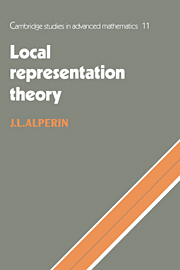 Local Representation Theory
Local Representation Theory Preface
Published online by Cambridge University Press: 12 January 2010
Summary
The representation theory of finite groups is at the same time an old and well-developed subject and a quickly changing and dynamic one. This may be daunting to many readers but we propose a remedy: in this short text, despite the great breadth of the topic, we shall take the reader to one of the high points of the subject. Hence, we shall go very far very quickly. This emphasis on speed and height suggests an analogy with climbing a mountain and doing it in quite short order. Carrying this analogy further, it means that we must not burden ourselves down with lots of heavy equipment. This means, on the one hand, that we can move quickly up the mountain but that, on the other hand, there will be times where we will not have the best tools available. Specifically, in our case, we are going to limit ourselves to a single set of methods, even though there are several, no one of which is sufficient to achieve all the results, even the most important ones.
Local representation theory is the part of the subject that involves and relates representations in characteristic zero and in characteristic p, p a prime. This is analogous with many ideas in number theory. Local representation theory is also local in a second sense: the p-local subgroups play a central role. These subgroups, the normalizers of the non-identity p-subgroups, are critical here (as they are all over group theory) and arise in all the basic theorems.
Information
- Type
- Chapter
- Information
- Local Representation TheoryModular Representations as an Introduction to the Local Representation Theory of Finite Groups, pp. ix - xPublisher: Cambridge University PressPrint publication year: 1986